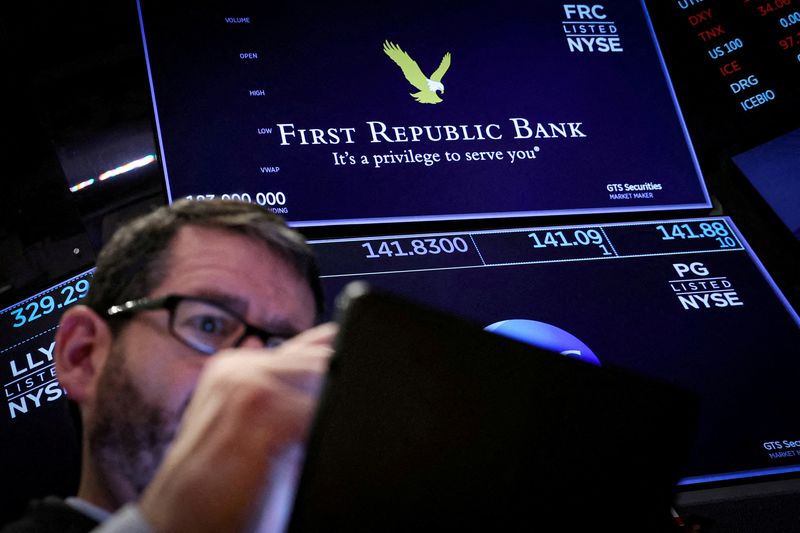By Manya Saini, David French and Saeed Azhar
(Reuters) -First Republic Bank faces dwindling and tough options to turn around its business with the creation of a 'bad bank' or asset sales possibilities, a source familiar with the matter said, after the lender showed the extent of deposit flight during last month's banking crisis.
First Republic reported a more than $100 billion plunge in deposits in the quarter in the aftermath of the biggest turmoil to hit the banking sector since 2008. Shares on Tuesday slid to a record low, down more than 40%.
"If someone were to acquire them ... there's going to be some big writedowns that would have to be taken against some of the assets given the rate cycle," Christopher Wolfe, head of North American banks at Fitch Ratings, told Reuters, referring to the bank's mortgage loan book and securities portfolio.
"The options are very challenging and probably very costly, especially for shareholders," Wolfe said. "Who's going to bear the cost?"
A ripple effect was felt among other banks and the broader market. Regional bank PacWest Bancorp fell 8%, Western Alliance (NYSE:WAL) Bancorporation 6%, Zions Bancorp 4% and brokerage Charles Schwab (NYSE:SCHW) Corp was down 3%. Large banks were also hit with JPMorgan (NYSE:JPM) down 1.8%.
The KBW Regional Banking Index dropped 3.8%, the broader S&P 500 bank index fell 2.6% and broader markets showed concern with U.S. stocks lower and U.S. Treasury yields falling.
First Republic said on Monday it was "pursuing strategic options" to quickly strengthen the bank, without providing details.
The lender was studying all options, a person familiar with the matter said on Monday, speaking on condition of anonymity because the discussions were private.
The source said the bank wanted the U.S. government to help by convening parties that could buoy San Francisco-based First Republic's fortunes, including private equity firms and big lenders.
Options include an asset sale of up to $100 billion, a source familiar with the situation said. Bloomberg News earlier reported the chance of asset sales and said buyers might receive incentives such as warrants or preferred equity.
David Chiaverini, analyst at brokerage firm Wedbush Securities said that if First Republic was willing to hand out preferred equity in exchange for selling loans above market value then "it will allow them in a way to sidestep from realizing the losses while at the same time help to capitalize the bank."
The bad bank possibility, earlier reported by CNBC, is a crisis-type method of isolating financial assets that have problems. Chiaverini said such a scenario would be a challenge as the bank's loans and securities are nearly all performing.
"So it's tough to even describe it as good asset and bad asset," Chiaverini said. "And that is why this scenario looks challenging."
FRC declined comment on the specific options.
Wall Street analysts expect challenges to extend through the year after two U.S. bank failures last month created a liquidity crunch at a slew of regional lenders.
Analysts at Wells Fargo (NYSE:WFC) said the reported deposit outflows were much worse than Wall Street estimates and at a "level that could prove very hard to come back from."
The spotlight on the bank has also drawn in retail investors. First Republic was the most ordered stock on Fidelity's platform on Monday, ending the day at a 12.2% gain, with a 64%/36% buy/sell split.
First Republic's ticker was also among the most active on retail investor-focused Stocktwits.com on Tuesday morning.
However, about 36% of the bank's free float of shares were short, according to FIS Astec Analytics. Data from another provider, S3, showed short interest rose by $389.8 million to $945.5 million in the past 30 days, and now accounts for 32.5% of its stock that is available to trade.
Deposit flight has been at the center of investor concerns as clients move capital toward money market funds that bring in higher returns or larger 'too-big-to-fail' institutions.
DEPOSITS DARKEN OUTLOOK
"First Republic appears to be in a holding pattern and is burning fuel. In short, the bank has lost meaningful deposits and is planning to shrink its asset base accordingly," said analysts at Evercore ISI.
The bank has been reeling as it navigates the twin challenges of assuring customers their deposits remain safe and investors that it has liquidity to emerge from the crisis.
"Although deposits have stabilized since quarter-end, the company's liquidity questions have turned into earnings questions," said analysts at Piper Sandler.
The sector-wide upheaval has led to the KBW Regional Banking Index contracting nearly 22% this year, while First Republic shares dived roughly 87% in the fallout.
"The question is whether the risk was First Republic specific or whether it will lead to larger banking concerns," brokerage JonesTrading wrote in a note.
First Republic said on Monday it plans to shrink its balance sheet and slash expenses by cutting executive compensation, paring back office space and laying off 20% to 25% of employees in the second quarter.

"We forecast the NIM to come under substantial pressure in Q2, negatively impacting the bank's earnings power significantly," analysts at Wedbush said.
Last month, concerns about the bank's health had prompted top power brokers including U.S. Treasury Secretary Janet Yellen, Federal Reserve Chair Jerome Powell and JPMorgan's CEO Jamie Dimon to put together an unprecedented $30 billion rescue deal.